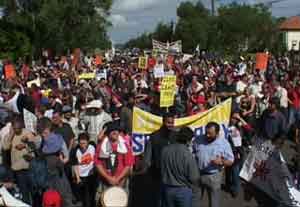 RADICAL
LEFT groups from around the world met in Sydney, Australia in early April to
discuss a wide variety of global issues – most notably, the ongoing US imperialist
war on terror and the rising tide of the anti-globalisation movement.
RADICAL
LEFT groups from around the world met in Sydney, Australia in early April to
discuss a wide variety of global issues – most notably, the ongoing US imperialist
war on terror and the rising tide of the anti-globalisation movement.
SECOND ASIA-PACIFIC INTERNATIONAL SOLIDARITY CONFERENCE
‘The deeper we go, the stronger we grow’
 RADICAL
LEFT groups from around the world met in Sydney, Australia in early April to
discuss a wide variety of global issues – most notably, the ongoing US imperialist
war on terror and the rising tide of the anti-globalisation movement.
RADICAL
LEFT groups from around the world met in Sydney, Australia in early April to
discuss a wide variety of global issues – most notably, the ongoing US imperialist
war on terror and the rising tide of the anti-globalisation movement.
Attended by over 750 people from more than 30 countries the second Asia Pacific International Solidarity Conference produced meaningful debates and strengthened international links of the organisations participating in the event.
‘The best way, we in India can oppose imperialist globalization and the war and racism is by defeating the Indian collaborators of US imperialism who are unleashing a reign of communal fascism” said Dipankar Bhattacharya, General Secretary, CPI (ML) Liberation in his inaugural address to the conference. Com. Dipankar said that while stepping up international political cooperation among broad sections of the anti-globalization forces, the radical left must also deepen the movement in every available national and local context. ‘The deeper we go, the stronger we grow,’ he pointed out.
Peter Boyle of the Democratic Socialist Party (DSP), which hosted the conference, said in his address that the current US military offensive was being combined with a new ideological offensive to break down the solidarity between the working masses in the Third and First worlds. “It’s one way of raising the sort of blind patriotism that can help con the masses into becoming cannon fodder,” he said, pointing to the dubious theories of ‘clash of civilizations’ and the demonisation of Islam being propagated by Western demagogues.
Others who addressed the conference included Roberto Baggio from the Brazilian Landless Rural Workers’ Movement (MST), Sonny Melencio, Chairperson of the Philippines Socialist Party of Labour, Victor Briz, President, Solidarity of Filipino Workers (BMP), Michael Albert, from ‘Z’ magazine and Z-Net in the US, Farooq Tariq of the Labor Party of Pakistan and Dita Sari, General Secretary of the Indonesian National Front for Labour Struggle (FNPBI).
Hundreds of Australian-based participants active in movements around Indigenous people’s rights, international solidarity, the environment, women’s rights, lesbian and gay rights, peace, social justice and trade union rights also conducted workshops. Australian left parties were also strongly represented. Action in Solidarity with Asia and the Pacific, formerly Action in Solidarity with Indonesia and East Timor, was launched by ASAP chairperson Max Lane at the conference dinner, which was also addressed by Victor Briz, president of the 250,000-strong BMP of the Philippines. Among the various themes discussed at the four-day conference were the impact of globalisation and militarism in Asia, the labour movement and global justice, race, class and colonialism in the 21st century and social alternatives and strategies to respond to the Asian economic crisis. An important aspect of the gathering was the discussion on the strengthening of ties between struggles in the region especially those against war, racism, corporate globalisation and national oppression. A major focus of many of the discussions was naturally the status of the various anti-globalization movements going on around the world – the latest being the massive rally of over 500,000 protestors in Barcelona, Spain in mid-March this year to coinciding with the European Union Summit.
Conference delegates participated in a protest of their own on March 31, when they joined over 1000 people outside the Villawood refugee prison to demand freedom for refugees kept in detention centres by the right-wing Australian government. Conference guests Nina Benjamin, from South Africa’s Khanya College, and Farooq Tariq, from Labour Party Pakistan, were also warmly received when they addressed a 1000-strong rally opposing Israeli aggression against Palestine, held in Sydney on April 1. An important event which figured prominently in many presentations was the second World Social Forum (WSF) at Porto Alegre, Brazil attended by over 50,000 people. The WSF in particular was seen as an important step forward in consolidating the mobilisations of the anti-globalization movement in a loose and unstructured, but nevertheless, organisational way.
Four resolutions were adopted by the conference: that participants support the “Call for Mobilisation” issued by the 2002 World Social Forum; endorse the proposal that the 2004 World Social Forum be held in India; that an Asia-Pacific gathering be held in Manila, Philippines, in 12 months’ time to discuss and strengthen coordination and cooperation of the anti-corporate globalisation and anti-war struggles; and finally, and most immediately, to call a region-wide emergency action in solidarity with the people of Palestine, on April 19.
– Sundaram